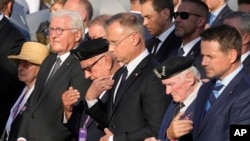The Polish and German presidents bowed their heads to the cadence of a military drum as they paid tribute Thursday to Poles slaughtered by Nazi Germany during the Warsaw Uprising of 1944 on the 80th anniversary of the outbreak of the ill-fated revolt.
As Poland marked the hallowed day, news broke that the oldest surviving insurgent in uprising, 106-year-old Barbara Sowa, died in the morning. With very few survivors left to take part in the ceremonies, it was a poignant reminder of the passing away of the generation shaped by the sacrifice of World War II.
Later, the city will stop and sirens will wail to pay tribute to the insurgents.
Polish President Andrzej Duda and German President Frank-Walter Steinmeier stood together, heads bowed, to remember those days of August in 1944. They paid tribute to the Wola Massacre, the mass-murder of civilians of Warsaw's Wola district carried out by the Germans from Aug. 5 to Aug. 12, 1944.
"They were led out of their homes, tenement houses, their homes were set on fire, and they themselves were shot in the streets, and their bodies were burned. Several tons of ashes were collected from the streets and squares of Wola, in order to place them in a common grave," Duda said.
The German president's bowed head and other symbolic gestures signaled remorse for the crimes of his nation. That Steinmeier "lays a wreath, bows his head, kneels before the commemorative cross," calls for respect, said Duda, speaking for the nation under brutal occupation from 1939-1945, which suffered the extermination of millions of its citizens, Christian and Jewish, and the near-total destruction of its capital city.
Warsaw's revolt began Aug. 1, 1944, by the clandestine Home Army, which acted on orders from Poland's government-in-exile in London.
The aim was to free the capital from German occupiers and take control of the country ahead of the advancing Soviet army. Moscow, intending to rule postwar Poland, withheld help and kept its Red Army positioned on the other side of the Vistula River as the capital bled and burned.
The Nazis, with their professional army and superior weaponry, killed 200,000 Polish fighters and civilians and razed the city in revenge.
Today the uprising is remembered by Poles as one of the most important moments in a long history of independence struggles, often against Russia. The courage of the fighters remains a defining memory in the Polish image of itself as a nation willing to make the ultimate sacrifice for freedom.
